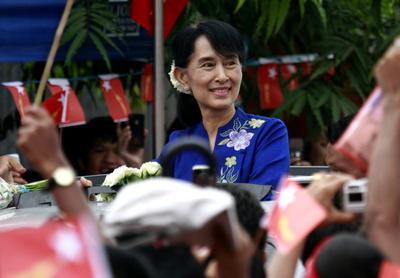Following the National League for Democracy’s (NLD) sweep of 43 out of 44 eligible upper and lower house seats in Myanmar’s 1 April 2012 by-elections, Aung San Suu Kyi initially refused to take the oath of office to ‘abide by’ the military-sponsored constitution, saying she would ‘respect’ it instead. After a few days of kerfuffle, Aung San Suu Kyi backed down and took the oath to abide by the constitution. In standing the NLD’s ground firmly and briefly, she made it clear that she would not be easily pushed aside in parliament, and that the constitution will need to be amended. The incidents surrounding Aung San Suu Kyi’s swearing into office also show that she is not unreasonably recalcitrant or above compromise when larger goals are at stake. Her public image has since benefitted from this storm in a teacup.
An electoral win for the NLD was a long time coming: after more than two decades of repression, Myanmar’s politics finally appears to have entered a democratic era. The result of Myanmar’s recent by-elections have far-reaching implications for domestic politics, the regional neighbourhood and the broader international community. But the country is far from being out of the woods of military authoritarianism. It is unlikely Myanmar’s democratic process will be reversed, but detours from the democratic road ahead cannot be ruled out.
Myanmar used to be called Burma. Many still call it Burma as a show of defiance against the military regime that has ruled the country since 1988. The NLD’s sweep and triumph in the April by-elections may have yielded less than 8 per cent of total parliamentary seats, but it will put pressure on key stakeholders to continue to use ‘Myanmar’ in recognition of the legitimacy of recent reforms. No doubt many will continue to protest, but the country’s forward momentum depends on its official name.
The NLD’s thumping victory under the iconic and vindicated Aung San Suu Kyi is full of portent for the Union Solidarity and Development Party (or USDP, the military’s electoral vehicle) because it suggests the NLD is likely to win by a massive landslide when general elections are held again in 2015. Even if the military retains its constitutionally mandated 25 per cent of seats in parliament, the USDP is unlikely to withstand the opposition’s election onslaught. As the main opposition party, the NLD is likely to gain control of the national assembly in three years.
But it is crucial for the NLD to prioritise the broader reform process over shorter-term electoral gains and temptations for retribution. Democratic transitions from military authoritarianism in other countries have taken many years, with ups and downs and with different modalities of civil–military power sharing. In Thailand, for instance, it took more than five decades to progress from outright military dictatorship to democratic rule, and the process is still playing out.
A return to outright dictatorship is unlikely. Myanmar’s reforms, which began with a pro-military constitution and a bogus election, have somehow taken on a life of their own. Suitors from abroad for business and commerce, and for aid and development, provide additional incentives to maintain momentum. Myanmar will also host the 2013 Southeast Asian Games and chair ASEAN in 2014. A return to military repression will result not only in a loss of face, but could potentially lose Myanmar the opportunity to host these prestigious international events. The generals’ pride was wounded when they had to forego the ASEAN chairmanship in 2005, so they are not keen to face another regional humiliation.
The immediate implication for the ASEAN neighbourhood centres on democratisation. ASEAN is home to the most diverse regime types among any regional organisation in the world. If democracy in Myanmar continues to go from strength to strength, the pressure to democratise in other ASEAN state will surely grow. Myanmar’s progress will advertise the benefits of reform to authoritarian regimes. The long and winding road of democratisation is necessarily preferable to the closed road of authoritarianism.
The chief challenge for Myanmar comes from history and from time: in the next few years this agrarian country must undergo rapid economic development and learn to grapple with the forces of globalisation. A successful transition will require a dynamic and cooperative power-sharing arrangement between the military and civil society. Both groups should work together toward democratic and inclusive electoral outcomes in 2015.
Thitinan Pongsudhirak is Director at the Institute of Security and International Studies, Faculty of Political Science, Chulalongkorn University, Thailand.

